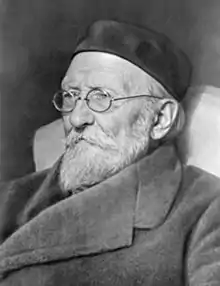Nikolai Nasonov
Nikolai Viktorovich Nasonov (Russian: Николай Викторович Насонов; 14 February 1855 – 11 February 1939) was a Russian zoologist. In 1879 he graduated from the Moscow State University (MSU) and became an assistant at its Zoological Museum. After defending his PhD in 1887 he lectured at MSU, and later worked in Trieste, Marseille and Warsaw. In 1890 he defended a habilitation on the evolution of anteaters.[1] In December 1897 he was elected as a corresponding and in March 1906 as a full member of the Russian Academy of Sciences.[2] All his four children became prominent scientists: sons Arseny, Dmitri and Vsevolod in history, biology and engineering, respectively, and daughter Antonina in the history of art.
Nikolai Nasonov | |
|---|---|
 | |
| Born | 14 February 1855 |
| Died | 11 February 1939 (aged 83) Moscow, USSR |
| Alma mater | Moscow State University |
| Known for | Nasonov pheromone, Nasonov's gland |
This article is issued from Wikipedia. The text is licensed under Creative Commons - Attribution - Sharealike. Additional terms may apply for the media files.